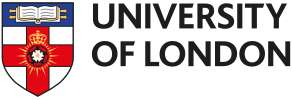As part of our celebration of Race Equality Week, the Online Library was lucky enough to sit down and speak with one of our students, the inspiring badminton Olympian Santi Suter-Wibowo to discuss her challenges and success secrets in both study, work and real life… and how she continues to make a difference in the world of sports.
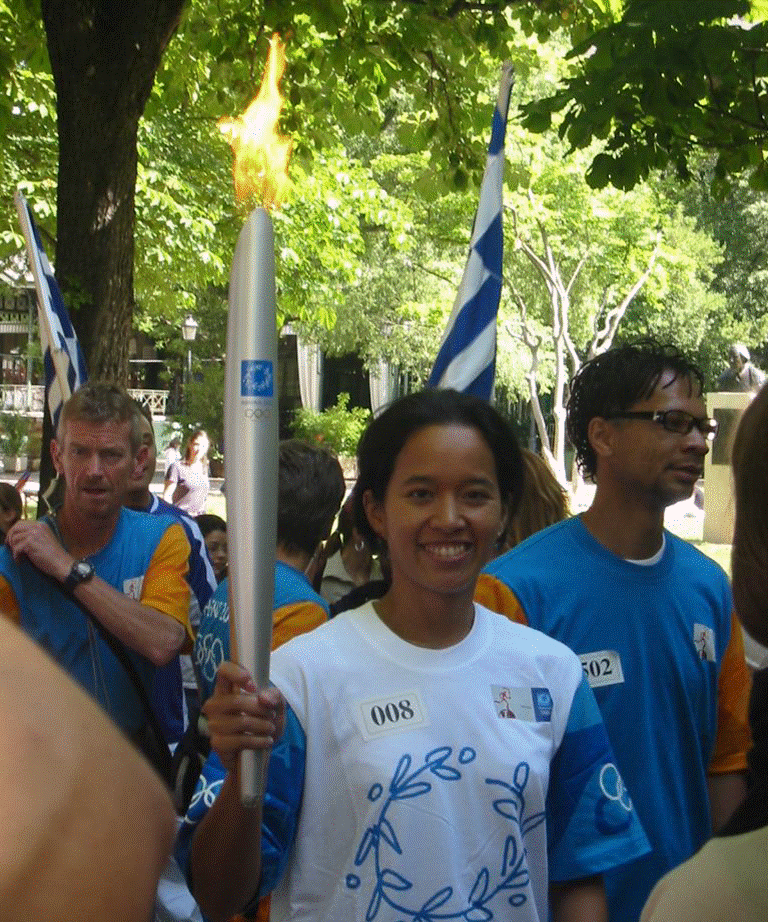
OL: What brought you to you the University of London?
SSW: I am in the PGCert in International Sports Management Programme. In 2021, I was awarded a 50% scholarship from the World Olympians Association and the World Academy of Sport. I was working at Credit Suisse at the same time, so it was quite challenging but I still made it within two years. I had decided to work and study during that time and I took part in the athlete365 Business Accelerator Program from Olympic Solidarity, which is open to any athlete worldwide. This week, I've just started the individual module Sports Event Management from the International Sports Management Programme as part of the Champions for Change Award I received from University of London.
OL: What inspired you to chose the PGCert in International Sports Management Programme?
I’m following my passion and it works with my lifestyle. I would like to return to the sports world after 20 years in industry. I’m open to new opportunities and having different skills.
OL: What was your career before pursuing a Sports Management degree?
SSW: Languages were very important to me as a child. I was quite a polyglot and thinking of becoming a translator. They are my second passion next to sport. I’ve been to 58 countries and different cities and I always try to learn languages when I am traveling... but my English teacher in high school told me, languages are good to have but you need to have something else you can use as well. So, then I started studying marketing and communications. Now, I am bringing with me 25 years of experience in marketing, project and event management from sports, insurance and the banking industry.
OL: How did you first enter the world of Professional Sports?
SSW: When I was about 7 years old, I started to play badminton but there were no other girls playing badminton in my club. In fact, in the beginning I was the only girl. I had to play against boys or adult women. At age ten, I joined the Junior Swiss National Team and started to do international tournaments. My first one was in England. I took part in 30 different tournaments during the last season of my sports career. My last international tournament was in Mauritius and the last European tournament as my farewell was in Geneva at my hometown club. I was also lucky, that I was able to run with the Olympic torch. That was the year of the Athens Olympics. The mayor was very generous with us and I got to keep it as a memory! Would you like to see it?
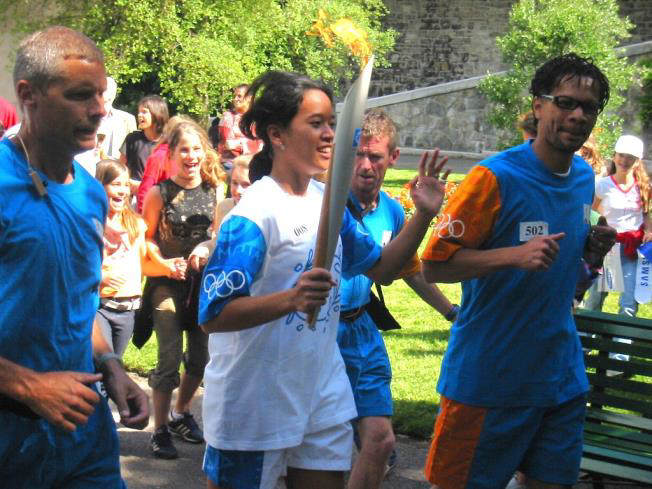
OL: Yes, Absolutely. Yes, ofcourse.
SSW: This is it, the original torch from Athens from 20 year ago.
OL: Wait, you keep it in a Fed Ex (shipping) box?
SSW: Well, it was in the cellar for many years... until recently. I was part of the ceremony where they planted the olive tree in the middle of Geneva and I also got to run with it as part of that.
OL: What was it like to take part in that? Did it influence your interest in helping other athletes?
SSW: It is something that will stay with me forever. I have launched a mentoring program for female athletes and para-athletes called Olympic Mentors for which, I receive a Champions for Change Award from University of London during the Paris Olympics last year. It‘s so nice that I can support other athletes. The first mentee of my program, Franziska Matile-Dörig lives in Winterthur, CH, so we can meet up in person. She initially wanted to qualify for the Paralympics. She won a bronze medal in Paris and became world champion two weeks later.
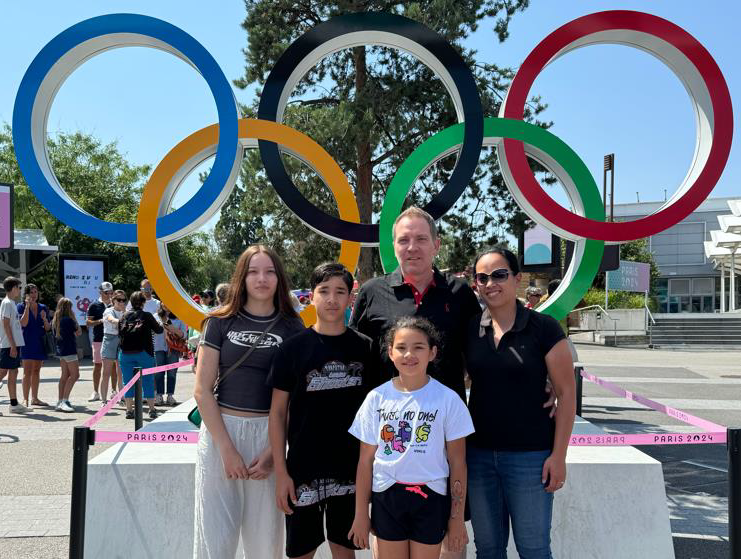
I am currently a member of the Panathlon Club Winterthur and I have also given presentations and tried give her a stronger network to help her with financial support and physical progression guidance. I’m very happy that I could make that story. Now, I am trying to continue this journey with a new mentee. She is an American handball player, who is 19 years old. She is preparing for Los Angeles, 2028. It’s quite special since female handball in the USA is not that big yet and therefore most of the players on the U.S. national team currently live in Europe. It’s quite international. Her name is Viva Kreis and she’s going to finish college in May and will return to Europe for a year and we’ll see how I can try to support her.
I also participated in the athlete365 mentoring program, both as a mentee and a mentor. I was then Mentor to Marga Crespì, a World and European champion and Olympic medallist from Spain. I just love to give back.
OL: How has the Olympian training influenced your studies and your current lifestyle?
SSW: Being an Olympian has definitely had an influence in my lifestyle. My family is getting bigger but I’m always very busy and I think if you have skills thanks to sport - time management, organization, resilience, team work, you don’t reach a goal alone. That was the same during my career, I was the one playing on the court but a lot of people supported me getting there, behind the scenes. I realize that network is really important and I really try to share that with the mentees and young athletes, who don’t necessarily think about that. You meet a lot of people during you career, players as well as coaches. Now when you meet them again. It’s so nice to see that some players became coaches or have different functions within badminton or in the corporate world and it can also help. This is something, which is important, which is why I’m always happy if I can help anyone.
OL: Is there a technique you use that helps you keep on track with your coursework readings?
SSW: Something I learned as an athlete is hyperfocus. I am a lifelong learner, always learning. The most important thing you learn studying online is discipline. You are not at a University. You are by yourself. You have to learn...how do you organize your day? It’s important to take advantage of webinars or any opportunities to chat with other peers, even if it’s online. It will sometimes give you a boost and you are not completely alone. It’s important to balance.
OL: Do you have advice for other students on using the Online Library or trying to do online research or study virtually?
SSW: You need to be patient, because you have to first understand how everything works and how the tools work. First read the assessment that you have to complete at the very beginning. Then, you will know what you need to know from the beginning rather than waiting till the last minute and reading all the chapters, this will help you to unlock your potential and succeed from the beginning. Also try to learn the technical part before and not closer to the deadline.
OL: When did you first use the Online Library?
SSW: When I started my degree programme.
OL: Do you use the Online Library regularly?
SSW: Honestly I use the Online Library the most throughout all of my studies, it’s incredibly useful for a student to have access to all these books and articles and I regret that when I finished my studies I no longer had access.
OL: What would you write to encourage other virtual students, who may be struggling with timing or scheduling?
SSW: Well, you can extend your day. You have to get up early in the morning. When I was at Credit Suisse, I was going into the office in Zurich, I was up at 4:30 a.m. preparing lunch for the kids , 5:30 a.m. on the train, 6:30 a.m. at the gym (one hour work out and shower) and then to the office, returning just before 7:30 p.m., when I’d pick up my youngest daughter from basketball and then come home. I would then continue when the kids were in bed. I would use that time to study. You try to get one or two hours or the weekends. Two or three days, I would give only full time for studies and no one could interrupt me during that time.
I would drive my son to handball practice and always had two laptops. One for work, one for private, depending where I was running errands on trains or commuting for work, I would use that time to study.
OL: Are there any particular experiences in either Sports or with your PGCert in International Sports Management that have inspired you to continue to work and volunteer in the international sports community?
SSW: I would like to highlight the extremely positive energy I could feel in the Olympic Village in Atlanta in 1996 and during my graduation ceremony at the University of London in 2024.
It was beautiful to see such a peaceful, colourful and joyful gathering of thousands of so many diverse athletes and students from all over the world surrounded by their families. Each of us was able to celebrate our personal success with excellence, respect and friendship in adequation with the Olympic values.
OL: Are there any final thoughts or words of wisdom you might like to share with our students?
SSW: It is a great honour to be a part of the University of London family especially knowing that we had Nelson Mandela studying there and I am so proud I had this opportunity. It is so important that we are in the world, where anyone can have access to education. You just need internet access and anything is possible. I think this is really great and I am really grateful for that. Use the time that you have. Use this time for yourself. It’s important.
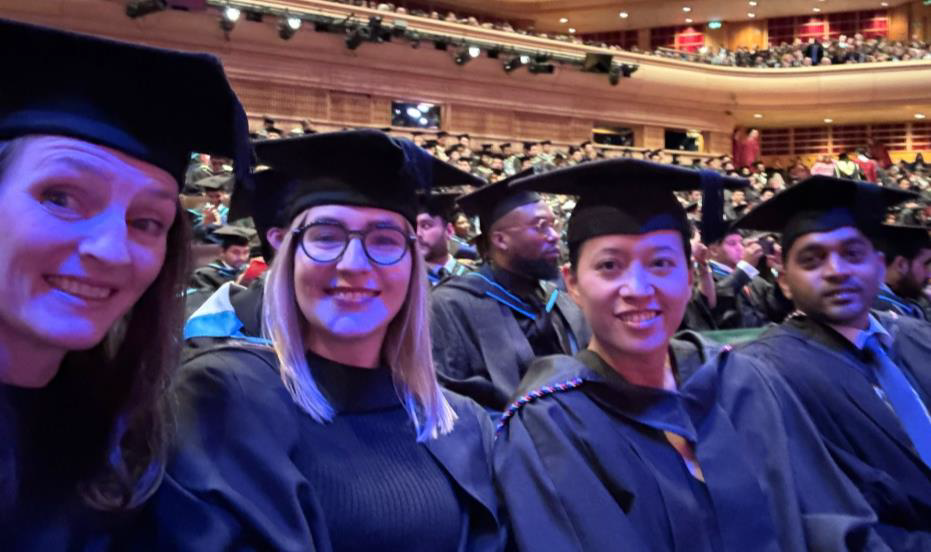
OL: Thank you Santi for sharing your story with us and our students as part of our Race Equality Week celebrations. Your constant volunteerism and enthusiasm are an inspiration.
